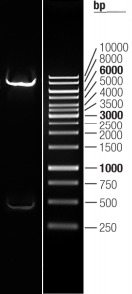Cck (BC028487) Mouse Tagged ORF Clone
CAT#: MR200794L4
- LentiORF®
Lenti ORF clone of Cck (mGFP-tagged) - Mouse cholecystokinin (cDNA clone MGC:41001 IMAGE:1400830)
"BC028487" in other vectors (4)
Interest in protein/lysate? Submit request here!
Specifications
| Product Data | |
| Type | Mouse Tagged ORF Clone |
| Tag | mGFP |
| Symbol | Cck |
| Vector | pLenti-C-mGFP-P2A-Puro |
| E. coli Selection | Chloramphenicol (34 ug/mL) |
| Mammalian Cell Selection | Puromycin |
| Sequence Data |
The ORF insert of this clone is exactly the same as(MR200794).
|
| Restriction Sites | SgfI-MluI Cloning Scheme for this gene |
| ACCN | BC028487 |
| ORF Size | 402 bp |
| OTI Disclaimer | The molecular sequence of this clone aligns with the gene accession number as a point of reference only. However, individual transcript sequences of the same gene can differ through naturally occurring variations (e.g. polymorphisms), each with its own valid existence. This clone is substantially in agreement with the reference, but a complete review of all prevailing variants is recommended prior to use. More info |
| OTI Annotation | This clone was engineered to express the complete ORF with an expression tag. Expression varies depending on the nature of the gene. |
| Product Components | The ORF clone is ion-exchange column purified, transfection-ready dried plasmid DNA, and shipped with 2 vector sequencing primers. |
| Reconstitution | 1. Centrifuge at 5,000xg for 5min. 2. Carefully open the tube and add 100ul of sterile water to dissolve the DNA. 3. Close the tube and incubate for 10 minutes at room temperature. 4. Briefly vortex the tube and then do a quick spin (less than 5000xg) to concentrate the liquid at the bottom. 5. Store the suspended plasmid at -20°C. The DNA is stable for at least one year from date of shipping when stored at -20°C. |
| Reference Data | |
| RefSeq | BC028487, AAH28487 |
| RefSeq Size | 816 bp |
| RefSeq ORF | 404 bp |
| Locus ID | 12424 |
| Cytogenetics | 9 F4 |
| Gene Summary | This gene encodes a member of the gastrin/cholecystokinin family of proteins. The encoded preproprotein is proteolytically processed to generate multiple protein products, including the peptide hormones cholecystokinin-8, -12, -33, and others. The encoded peptides have been shown to regulate gastric acid secretion and food intake. A sulfated form of cholecystokinin-8 may modulate neuronal activity in the brain. Homozygous knockout mice for this gene exhibit impaired insulin secretion, enhanced insulin sensitivity, and resistance to obesity. Alternative splicing results in multiple transcript variants. [provided by RefSeq, Nov 2015] |
Documents
| Product Manuals |
| FAQs |
Resources
Other Versions
| SKU | Description | Size | Price |
|---|---|---|---|
| MC206823 | Cck (untagged) - Mouse cholecystokinin (cDNA clone MGC:41001 IMAGE:1400830), (10ug) |
USD 340.00 |
|
| MR200794 | Cck (Myc-DDK-tagged) - Mouse cholecystokinin (cDNA clone MGC:41001 IMAGE:1400830) |
USD 68.00 |
|
| MG200794 | Cck (GFP-tagged) - Mouse cholecystokinin (cDNA clone MGC:41001 IMAGE:1400830) |
USD 300.00 |
|
| MR200794L3 | Lenti ORF clone of Cck (Myc-DDK-tagged) - Mouse cholecystokinin (cDNA clone MGC:41001 IMAGE:1400830) |
USD 624.00 |
{0} Product Review(s)
Be the first one to submit a review






























































































































































































































































 Germany
Germany
 Japan
Japan
 United Kingdom
United Kingdom
 China
China

